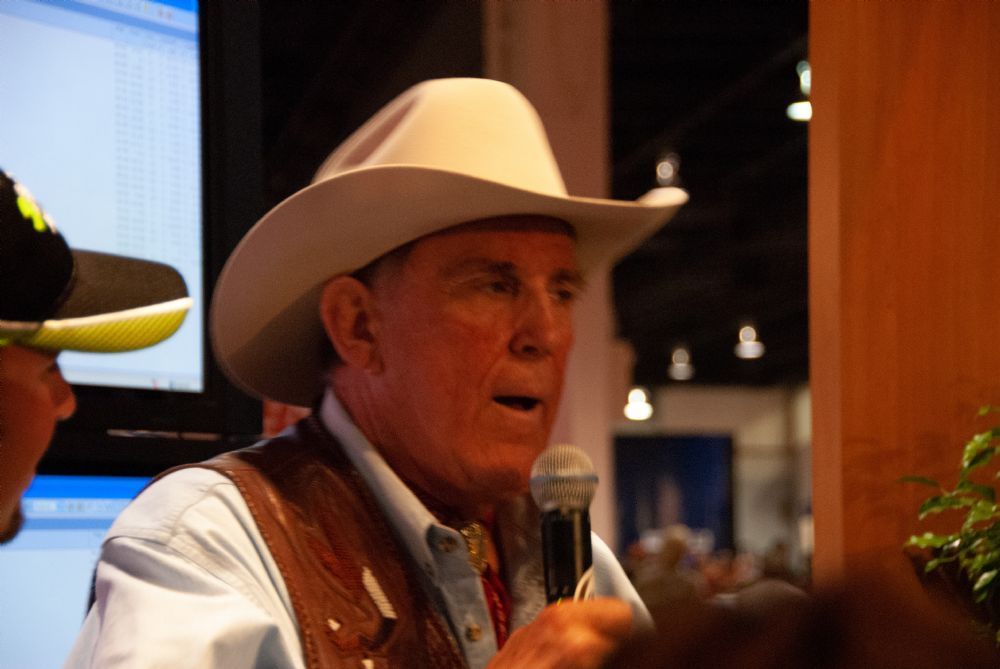Ray Scott passed away on Sunday May 8 at around 11:30 p.m. He died peacefully in his sleep of natural causes. Scott was 88 years old.
Scott founded the first national professional bass fishing circuit, the Bassmaster Tournament Trail, in 1967 and the following year founded the Bass Anglers Sportsman Society — B.A.S.S. — which would grow to become the world’s largest fishing organization.
“Our entire organization was saddened to hear about the passing of our founder, Ray Scott,” said Chase Anderson, B.A.S.S. CEO. “Ray’s passion and vision for bass fishing birthed our entire industry more than 50 years ago when he founded B.A.S.S. and started the first professional fishing tournament series. His legacy is felt to this day and continues to influence B.A.S.S., the world’s largest fishing membership organization. Ray’s contributions and impact on conservation and his advocacy and passion for anglers and our sport set the standard for tournament fishing and are something we will always strive to uphold. Our hearts and prayers are with the Scott family.”
The bass tournament competition Scott created rewarded anglers who caught the heaviest limits of bass in the three- or four-day events, which served as the proving grounds for rapid advancements in bass boats, outboard engines, fishing tackle, lures and electronics. Everyday anglers began purchasing whatever the bass pros were using, spawning a massive bass fishing industry that today has an economic impact in excess of $125 billion per year and employs more than 800,000 people nationwide.
Before Scott began pursuing his dream of organizing America’s bass anglers, the sport was a laid-back, mainly southern pastime that was largely overlooked by the trout-focused national outdoor media. To serve B.A.S.S. members and to publicize the tournament trail, Scott launched Bassmaster Magazine, which the New York Times described as “the Bible of Bass Fishing,” and which ultimately would be delivered to 650,000 B.A.S.S. members monthly.
In 1984, he and then-Bassmaster Editor Bob Cobb created The Bassmasters TV show, which attracted more than 1 million viewers weekly on The Nashville Network. Aired today on Fox Sports, the program is one of the longest-running and most-watched fishing shows in history.
Not only did Scott help grow the sport of bass fishing, but he also did more than any other individual to preserve it.
In 1972, he debuted the “Don’t Kill Your Catch” campaign and mandated that all tournament competitors’ boats feature an aerated livewell to keep their bass alive.
“I didn’t invent catch and release,” Scott acknowledge, “but we did make it popular in bass fishing, and that changed the sport in so many ways. We preached that a bass is too valuable to be caught only once. We helped fishermen learn how great it felt to catch a 5- or 6-pound bass and then lean over and let it go and watch it swim away, hopefully to be caught again.”
As a result, the catch-and-release ethic caught on so well that more than 90% of all bass anglers today release all or most of the bass they catch.
Scott and his rapidly growing B.A.S.S. organization also crusaded against industrial pollution of America’s waterways. In 1970 and ’71, Scott filed some 200 anti-pollution lawsuits, drawing national attention to declining water quality and contributing significantly to passage of the Clean Water Act of 1972.
He was an early advocate of bass fisheries research, and he campaigned zealously for passage of the federal Wallop-Breaux Sportfish Restoration Amendment of 1984. When the bill stalled in Congress, Scott’s friendship with then-Vice President George H.W. Bush helped ensure enactment of the amendment. As a result, approximately $375 million in sportfish restoration allocations are provided annually to state fisheries agencies for management, aquatic education and public access projects.
Few individuals have had a more positive impact on boating safety than Scott. Early on, he began requiring tournament competitors to wear personal flotation devices whenever boating, and he convinced manufacturers to make emergency shut-off devices — “kill switches” — standard features on motorboats. In 1994, he was instrumental in passing the comprehensive Boating Safety Reform Act in Alabama, which became the first state to require that boat drivers pass a written exam and obtain a boat operator’s license.
In recognition of his efforts, President Jimmy Carter appointed Scott to the U.S. Coast Guard’s National Boating Safety Advisory Council, and in 2002, he was inducted into the National Boating Safety Hall of Fame.
Scott earned numerous other accolades and honors for his contributions to outdoor recreation over the years.
Field & Stream Magazine listed Scott — along with President Teddy Roosevelt, environmentalist Rachel Carson and naturalist/conservationist Aldo Leopold — among 20 individuals who most influenced outdoor sports during the 20th Century.
He was inducted into the inaugural class of the Bass Fishing Hall of Fame in 2001, the International Game Fish Association Hall of Fame in 2004 and the National Freshwater Fishing Hall of Fame in 1987. He was named the 1988 Sport Fisherman of the Year by the Sport Fishing Institute.
The elder President Bush picked Scott as his Alabama state chairman during his 1979-80 presidential campaign, and the two remained good friends and fishing companions throughout Bush’s terms as Vice President and President of the United States.
Scott’s was a true rags-to-riches story. He was born in Montgomery, Ala., on Aug. 24, 1933, and grew up there during the depths of the Great Depression. His father operated an ice cream cart and his mother worked as a hairdresser to support the family, which grew to include Ray, his brother and three uncles — all living in a one-bedroom home. Scott contributed to the family treasury by delivering groceries on his bicycle, mowing lawns and selling peanuts at baseball games.
Scott suffered from dyslexia, which contributed to his having to repeat eighth grade, but he eventually managed to earn a degree in Business Administration from Auburn University and soon afterward became one of Mutual of New York insurance company’s top salesmen in the Southeast.
In recognition of his successes, Scott received the 2003 Horatio Alger Award, which honors the achievements of outstanding Americans who have succeeded in spite of adversity.
After a decade in the life insurance business, Scott had a vision that he might be the one to elevate the national profile of bass fishing to be, as he said, “on par with golf” and worthy of television exposure. That year, 1967, he quit his job and began organizing the first major national bass fishing tournament, the All American at Beaver Lake, Ark. The event was successful enough for Scott to begin holding tournaments at other reservoirs in the South and to launch B.A.S.S. and Bassmaster early in 1968.
His brainchild, the annual Bassmaster Classic world championship, grew from two dozen competitors and about that many spectators at Lake Mead, Nev., in 1971, to become the biggest event in sportfishing over the next half-century. Today, the Classic and related events such as the Classic Outdoor Expo record more than 100,000 fishing fans each year.
He sold B.A.S.S. to an investment group including his executive vice president, Helen Sevier, and other employees in 1986, but he continued to serve as emcee of the Classic for several more years. He later became a consultant and a popular spokesman for numerous companies in the fishing industry, and he launched a successful hunting industry enterprise to market deer feed and related products through his Whitetail Institute.
After a half-century of helping to grow and shape the sportfishing industry worldwide, Scott retired to his farm near Pintlala, Ala., where he remained mostly out of the public eye in the years prior to his death.
He is survived by his wife Hope Susan Scott and four children; Ray Wilson Scott III (Vickie), Steven Leo Scott (Kelly), Jennifer Eunice Epperson (Larry), Wilson Freeman Scott (Noel), 10 grandchildren and three great grandchildren. He was preceded in death by two brothers, Daniel and Edward Scott, and his first wife Eunice Hiott Scott.
There will be a celebration of life service at some time in the future. Future details are pending.

 Login
Login




